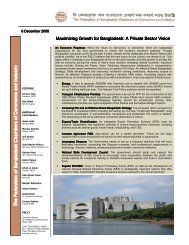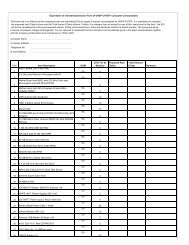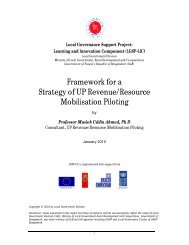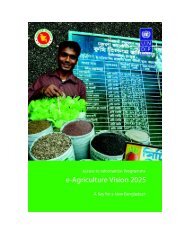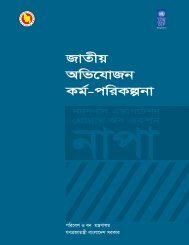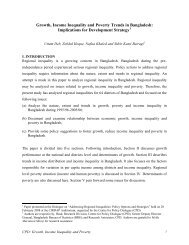The probable impacts of climate change on poverty - UNDP
The probable impacts of climate change on poverty - UNDP
The probable impacts of climate change on poverty - UNDP
You also want an ePaper? Increase the reach of your titles
YUMPU automatically turns print PDFs into web optimized ePapers that Google loves.
Executive Summary<br />
<str<strong>on</strong>g>The</str<strong>on</strong>g> Resp<strong>on</strong>ding Probable Impacts to <str<strong>on</strong>g>The</str<strong>on</strong>g> <str<strong>on</strong>g>of</str<strong>on</strong>g> Millennium Climate Change Development <strong>on</strong> Poverty Challenge and Ec<strong>on</strong>omic through Growth Private and Sector’s Involvement in Bangladesh<br />
the Opti<strong>on</strong>s <str<strong>on</strong>g>of</str<strong>on</strong>g> Coping with adverse Effect <str<strong>on</strong>g>of</str<strong>on</strong>g> Climate Change in Bangladesh<br />
Climate <str<strong>on</strong>g>change</str<strong>on</strong>g> is a reality and no l<strong>on</strong>ger a future<br />
c<strong>on</strong>cern. Many adverse effects <str<strong>on</strong>g>of</str<strong>on</strong>g> <str<strong>on</strong>g>climate</str<strong>on</strong>g> <str<strong>on</strong>g>change</str<strong>on</strong>g> stimuli<br />
including variability and extreme are already visible. <str<strong>on</strong>g>The</str<strong>on</strong>g><br />
Fourth Assessment Report (AR4) <str<strong>on</strong>g>of</str<strong>on</strong>g> the<br />
Intergovernmental Panel <strong>on</strong> Climate Change (IPCC) has<br />
reported that the average global surface temperature<br />
has increased by 0.74oC during last 100 years. It is also<br />
reported that the sea level rose at an average rate <str<strong>on</strong>g>of</str<strong>on</strong>g> 1.8<br />
mm per year over 1961 to 2003 and mountain glaciers<br />
and snow cover have declined <strong>on</strong> average in both<br />
hemispheres. C<strong>on</strong>tinued greenhouse gas emissi<strong>on</strong>s at or<br />
above current rates would cause further warming and<br />
induce many <str<strong>on</strong>g>change</str<strong>on</strong>g>s in the global climatic system<br />
during the 21st century. It has also stated that <str<strong>on</strong>g>impacts</str<strong>on</strong>g><br />
during the 21st century would very likely be larger than<br />
those observed during the 20th century. For South Asia,<br />
IPCC report predicts that m<strong>on</strong>so<strong>on</strong> rainfall will increase,<br />
resulting in higher flows during m<strong>on</strong>so<strong>on</strong> seas<strong>on</strong> in the<br />
river system. It has also predicted that sea level rise will<br />
be between 0.18 to 0.79 meters which will lead to<br />
salinity intrusi<strong>on</strong> and coastal flooding.<br />
Bangladesh is already vulnerable to many <str<strong>on</strong>g>climate</str<strong>on</strong>g><br />
<str<strong>on</strong>g>change</str<strong>on</strong>g> related extreme events. It is expected that<br />
<str<strong>on</strong>g>climate</str<strong>on</strong>g> <str<strong>on</strong>g>change</str<strong>on</strong>g> will bring <str<strong>on</strong>g>change</str<strong>on</strong>g>s in characteristics <str<strong>on</strong>g>of</str<strong>on</strong>g><br />
extreme events and gradual <str<strong>on</strong>g>change</str<strong>on</strong>g>s phenomen<strong>on</strong> <str<strong>on</strong>g>of</str<strong>on</strong>g><br />
the physical and natural systems. Due to higher level <str<strong>on</strong>g>of</str<strong>on</strong>g><br />
dependency <strong>on</strong> natural resource base, overall <str<strong>on</strong>g>impacts</str<strong>on</strong>g> <str<strong>on</strong>g>of</str<strong>on</strong>g><br />
<str<strong>on</strong>g>climate</str<strong>on</strong>g> <str<strong>on</strong>g>change</str<strong>on</strong>g> <strong>on</strong> Bangladesh would be significant. It is<br />
estimated that <str<strong>on</strong>g>climate</str<strong>on</strong>g> <str<strong>on</strong>g>change</str<strong>on</strong>g> could affect more than<br />
70 milli<strong>on</strong> people <str<strong>on</strong>g>of</str<strong>on</strong>g> Bangladesh. Key factors<br />
c<strong>on</strong>tributing to its vulnerability are geographic locati<strong>on</strong>,<br />
low elevati<strong>on</strong>, high populati<strong>on</strong> density, poor<br />
infrastructure, high levels <str<strong>on</strong>g>of</str<strong>on</strong>g> <strong>poverty</strong> and dependency<br />
<strong>on</strong> natural resources. Coastal resources up<strong>on</strong> which the<br />
most people depend are likely to be affected severally<br />
due to <str<strong>on</strong>g>climate</str<strong>on</strong>g> variability and <str<strong>on</strong>g>change</str<strong>on</strong>g>. It is predicted that<br />
for 45 cm rise <str<strong>on</strong>g>of</str<strong>on</strong>g> sea level may inundate 10-15% <str<strong>on</strong>g>of</str<strong>on</strong>g> the<br />
land by the year 2050 resulting over 35 milli<strong>on</strong> <str<strong>on</strong>g>climate</str<strong>on</strong>g><br />
migrant from the coastal districts.<br />
Ultimately adverse <str<strong>on</strong>g>impacts</str<strong>on</strong>g> <str<strong>on</strong>g>of</str<strong>on</strong>g> <str<strong>on</strong>g>climate</str<strong>on</strong>g> <str<strong>on</strong>g>change</str<strong>on</strong>g> will have<br />
the potential to undermine <strong>poverty</strong> reducti<strong>on</strong> efforts<br />
and could compromise the Millennium Development<br />
Goals (MDGs) and targets, such as the reducti<strong>on</strong> <str<strong>on</strong>g>of</str<strong>on</strong>g><br />
<strong>poverty</strong> and hunger by 2015. <str<strong>on</strong>g>The</str<strong>on</strong>g> Nati<strong>on</strong>al Strategy for<br />
Accelerated Poverty Reducti<strong>on</strong> (2009-2011) has<br />
recognised <str<strong>on</strong>g>climate</str<strong>on</strong>g> <str<strong>on</strong>g>change</str<strong>on</strong>g> as <strong>on</strong>e <str<strong>on</strong>g>of</str<strong>on</strong>g> the emerging<br />
issues in pro-poor growth. Poor people are generally<br />
most vulnerable to <str<strong>on</strong>g>climate</str<strong>on</strong>g> <str<strong>on</strong>g>change</str<strong>on</strong>g> because they live in<br />
areas more pr<strong>on</strong>e to flooding, cycl<strong>on</strong>es, droughts etc.,<br />
xiii




